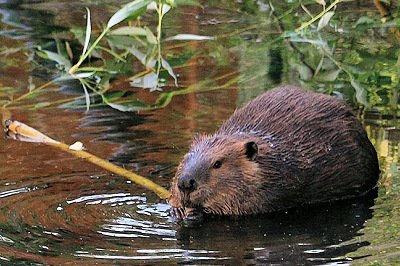On split vote, ODFW denies petition to consider halt to beaver trapping

SALEM, Ore. (KTVZ) -- After hearing testimony from about 30 people, the Oregon Fish and Wildlife Commission denied a petition on a 3-3 tie vote Friday that would have initiated rulemaking to consider ending beaver hunting and trapping on federal lands.
Commissioners had discussed this issue back in June, during adoption of trapping regulations, and out of those discussions came the creation of a new Beaver Management Working Group.
During Friday’s meeting, commissioners indicated their continued commitment to beaver conservation by directing ODFW staff to analyze and provide guidance on beaver management in the context of climate change, habitat, benefits to fish and other species, and water flow retention and temperature.
ODFW staff were directed to work in collaboration with commission liaison Vice-Chair Greg Wolley on the issue and use the newly formed Beaver Management Working Group as a key part of public engagement.
Learn more about beavers: https://www.dfw.state.or.us/wildlife/living_with/beaver.asp
News release from the Center for Biological Diversity.
Oregon Rejects Proposal to Ban Beaver Trapping, Hunting on Federal Lands
PORTLAND, Ore.— The Oregon Fish and Wildlife Commission today rejected a petition filed by the Center for Biological Diversity, scientists, and other conservation groups to permanently close commercial and recreational beaver trapping and hunting on the state’s federally managed public lands. Beavers are Oregon’s official state animal, but they can be legally hunted and trapped with few limits.
After nearly five hours of testimony and deliberation, the commission voted 5-1 to deny the petition and instead directed agency staff to make recommendations on beaver management and continue with a stakeholder work group. The Commission did not establish a timeline for this process or commit to future rulemaking.
The center's Oregon policy director, Quinn Read, said a commissioner made an initial motion to accept the petition, and the vote was 3-3, meaning it failed. A subsequent motion was made to deny the petition and proceed with what Read called "an ill-defined stakeholder process." That passed 5-1.
“This disappointing decision ignores science and puts Oregon in a worse place to combat threats like climate change, habitat loss and wildfire,” said Read said. “Beavers have an important role to play in making our state resilient to these threats. Unfortunately, it looks like politics once again took priority over science. We expected better from the Beaver State.”
The Oregon Fish and Wildlife Commission first discussed this issue in June as part of its review of the state’s furbearer regulations. It was rejected then as being outside the scope of that process, so the Center and its partners filed a formal rulemaking petition in September. The petition proposed a ban on commercial and recreational trapping and hunting on federally managed public lands in Oregon and the waters that flow through them.
Beavers are a keystone species and offer widely recognized ecological, economic and social benefits. The habitats they create and maintain improve water quality, reduce the impacts of floods, make landscapes more resilient to wildfire, and restore natural water flows. This benefits humans and a wide variety of fish and wildlife, including highly endangered coho salmon.
Beaver populations have been significantly reduced from historic levels through hunting and trapping. Today few people in Oregon are licensed to trap or hunt beavers. But annual culling of the species harms beaver populations and limits the good they can do for the environment.
The Center for Biological Diversity is a national, nonprofit conservation organization with more than 1.7 million members and online activists dedicated to the protection of endangered species and wild places.